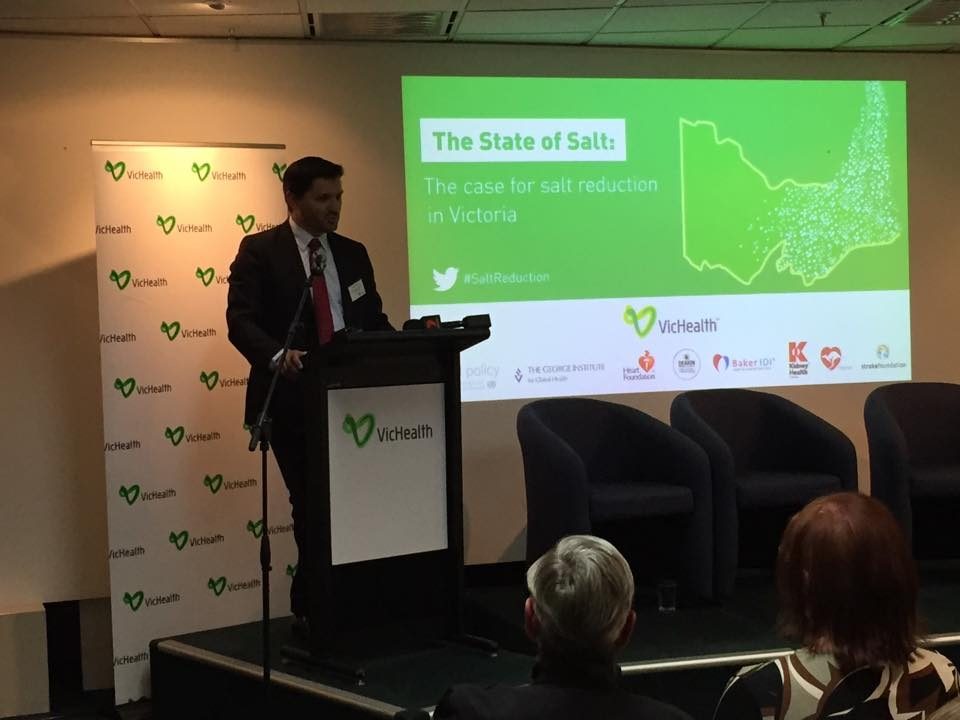
Salt partnership works to save hundreds of lives
The lives of 800 Victorians can be saved every year if people reduce their salt intake by less than a teaspoon a day, according to new research by The George Institute for Global Health.
Executive Director of the Institute and Professor of Medicine at the University of Sydney, Vlado Perkovic, said it was a simple solution that could have a profound impact on families across the state.
“The World Health Organisation (WHO) guideline for adult salt intake is five grams per day, which is about one small teaspoon,” Prof Perkovic said.
“Our research has shown that Victorians are eating around eight grams of salt per person a day, so reducing the intake by just three grams will make all the difference.
“800 people is the size of a school or a small town - imagine saving that many lives every year.
“Through our partnership with VicHealth we hope to reach the WHO targets.”
VicHealth CEO Jerril Rechter said the partnership would work with governments, the food industry, health groups, non-government organisations and the public to increase awareness and save lives.
“We will work to ensure that policies and initiatives that support a healthier food supply are established, resourced and monitored and will support the food industry to find solutions to lowering salt in foods and meals,” Ms Rechter said.
Professor Perkovic said that not adding salt to food at the dinner table was only half the battle.
“Around 70% of the salt we eat is already hidden in processed foods, with only a small proportion being what we add ourselves at meal times,” he said.
“So the only way that we will effectively achieve a reduction is by getting the food industry on board.
“There are the obvious culprits, such as salty chips and bacon, as well as takeaway pizzas but what not everyone realises is that many of our staple foods, such as bread, cheese, breakfast cereals and soups and sauces also contain relatively high levels of salt.”
Dr Jacqui Webster, Director of the WHO Collaborating Centre on Population Salt Reduction, which led the research, which was funded by VicHealth, at the George Institute, said;
- A reduction in salt intake of 3 grams per day would reduce strokes by 13% and CHD by 10% as a result of the reductions in blood pressure
- According to The Heart Foundation there were around approximately 2,500 stroke deaths and 4,600 coronary heart disease (CHD) deaths in Victoria in 2012
- So a 13% and 10% decrease in stroke and CHD respectively, would prevent around 800 deaths each year
“This doesn’t take into account the fact that about half of strokes aren’t fatal but often lead to disability, which is debilitating both to families and to the health system,” she said.
“So the total burden of death and disability averted would actually be much higher.”
Professor Perkovic said there were also huge financial benefits to reducing salt intake.
“The costs saved to the Victorian health budget could exceed $50 million a year,” he said.
“Some companies are already making reductions, but much more needs to be done and that’s why partnerships like this, with the Victorian Government, are important.”
The State of Salt: The Case for Salt Reduction in Victoria and more information can be found at www.vichealth.vic.gov.au/state-of-salt
MEDIA ENQUIRIES
Aaron Wakeley, Senior Media Advisor, Australia
The George Institute for Global Health
P: 0417 249 295
E: awakeley@georgeinstitute.org.au



